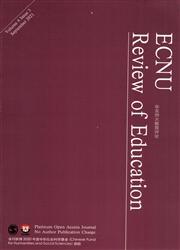Rethinking Ignorance Through Confucianism and Daoism: Propriety, Transcendence, and Their Educational Implications
IF 2.6
Q1 EDUCATION & EDUCATIONAL RESEARCH
引用次数: 0
Abstract
Ignorance has been seen as negative in the mainstream philosophical narrative and knowledge-based society. This study introduces Chinese epistemic traditions of Confucianism and Daoism as resources to reunderstand ignorance and current educational issues. Guided by hermeneutic openness, this study fuses ancient epistemic and modern educational horizons by reinterpreting early Confucian and Daoist classics. The boundary between ignorance and knowledge is flexible and blurry in Confucianism and Daoism, and ignorance is distinctively understood as Confucian admissible propriety and Daoist transcendence of conventional knowledge. Rooted in these epistemologies, Confucianism and Daoism have developed unique educational ideas and forms— congyou (从游) and zuowang (坐忘)—which advocate moral socialization and self-reflexivity beyond knowing through language. These traditions inspire today's educators and learners to find more space for self-formation, appropriate forgetting, and illuminating intuition in education. As an initial exploration, this study examines potential nonnegative ignorance and its educational implications in Confucian and Daoist wisdom. The findings are instructive for rethinking today's knowledge-based society and the text-oriented education of Chinese culture and can contribute to world epistemic diversity and cultural interactions.儒道对无知的再思考:礼、超越及其教育意蕴
在主流哲学叙事和知识型社会中,无知一直被视为负面的。本研究以中国儒家和道家的认知传统为资源,重新认识无知和当前的教育问题。本研究以解释学的开放性为指导,通过对早期儒家和道家经典的重新诠释,融合了古代认识论和现代教育视野。儒道家对无知与知识的界限是灵活而模糊的,无知被独特地理解为儒家的允礼和道家对传统知识的超越。基于这些认识论,儒家和道家发展了独特的教育理念和形式——从教和作教——它们提倡道德社会化和超越语言认知的自我反思。这些传统激励着今天的教育者和学习者在教育中为自我形成、适当遗忘和启发性直觉寻找更多的空间。作为初步的探索,本研究考察了儒家和道家智慧中潜在的非消极无知及其教育意义。研究结果对反思当今知识型社会和中国文化文本教育具有指导意义,并有助于促进世界认知多样性和文化互动。
本文章由计算机程序翻译,如有差异,请以英文原文为准。
求助全文
约1分钟内获得全文
求助全文
来源期刊

ECNU Review of Education
Social Sciences-Education
CiteScore
4.90
自引率
0.00%
发文量
41
审稿时长
10 weeks
 求助内容:
求助内容: 应助结果提醒方式:
应助结果提醒方式:


